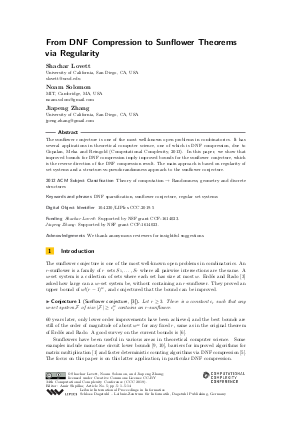From DNF Compression to Sunflower Theorems via Regularity
Authors Shachar Lovett, Noam Solomon, Jiapeng Zhang
-
Part of:
Volume:
34th Computational Complexity Conference (CCC 2019)
Part of: Series: Leibniz International Proceedings in Informatics (LIPIcs)
Part of: Conference: Computational Complexity Conference (CCC) - License:
 Creative Commons Attribution 3.0 Unported license
Creative Commons Attribution 3.0 Unported license
- Publication Date: 2019-07-16
File

PDF
LIPIcs.CCC.2019.5.pdf
- Filesize: 435 kB
- 14 pages
Document Identifiers
Subject Classification
ACM Subject Classification
- Theory of computation → Randomness, geometry and discrete structures
Keywords
- DNF sparsification
- sunflower conjecture
- regular set systems
Metrics
- Access Statistics
-
Total Accesses (updated on a weekly basis)
0Document
0Metadata
Abstract
The sunflower conjecture is one of the most well-known open problems in combinatorics. It has several applications in theoretical computer science, one of which is DNF compression, due to Gopalan, Meka and Reingold (Computational Complexity, 2013). In this paper, we show that improved bounds for DNF compression imply improved bounds for the sunflower conjecture, which is the reverse direction of the DNF compression result. The main approach is based on regularity of set systems and a structure-vs-pseudorandomness approach to the sunflower conjecture.
Cite As Get BibTex
Shachar Lovett, Noam Solomon, and Jiapeng Zhang. From DNF Compression to Sunflower Theorems via Regularity. In 34th Computational Complexity Conference (CCC 2019). Leibniz International Proceedings in Informatics (LIPIcs), Volume 137, pp. 5:1-5:14, Schloss Dagstuhl – Leibniz-Zentrum für Informatik (2019)
https://doi.org/10.4230/LIPIcs.CCC.2019.5
BibTex
@InProceedings{lovett_et_al:LIPIcs.CCC.2019.5,
author = {Lovett, Shachar and Solomon, Noam and Zhang, Jiapeng},
title = {{From DNF Compression to Sunflower Theorems via Regularity}},
booktitle = {34th Computational Complexity Conference (CCC 2019)},
pages = {5:1--5:14},
series = {Leibniz International Proceedings in Informatics (LIPIcs)},
ISBN = {978-3-95977-116-0},
ISSN = {1868-8969},
year = {2019},
volume = {137},
editor = {Shpilka, Amir},
publisher = {Schloss Dagstuhl -- Leibniz-Zentrum f{\"u}r Informatik},
address = {Dagstuhl, Germany},
URL = {https://drops.dagstuhl.de/entities/document/10.4230/LIPIcs.CCC.2019.5},
URN = {urn:nbn:de:0030-drops-108277},
doi = {10.4230/LIPIcs.CCC.2019.5},
annote = {Keywords: DNF sparsification, sunflower conjecture, regular set systems}
}
Author Details
Funding
- Lovett, Shachar: Supported by NSF grant CCF-1614023.
- Zhang, Jiapeng: Supported by NSF grant CCF-1614023.
Acknowledgements
We thank anonymous reviewers for insightful suggestions.
References
-
Noga Alon, Amir Shpilka, and Christopher Umans. On sunflowers and matrix multiplication. computational complexity, 22(2):219-243, 2013.

-
Ryan Alweiss. Personal communication, 2019.

-
Paul Erdős and Richard Rado. Intersection theorems for systems of sets. Journal of the London Mathematical Society, 35(1):85-90, 1960.

-
Mika Goos, Shachar Lovett, Raghu Meka, Thomas Watson, and David Zuckerman. Rectangles are nonnegative juntas. SIAM Journal on Computing, 45(5):1835-1869, 2016.

-
Parikshit Gopalan, Raghu Meka, and Omer Reingold. DNF sparsification and a faster deterministic counting algorithm. Computational Complexity, 22(2):275-310, 2013.

-
Alexandr V Kostochka. Extremal Problems on Δ-Systems. In Numbers, Information and Complexity, pages 143-150. Springer, 2000.

-
Xin Li, Shachar Lovett, and Jiapeng Zhang. Sunflowers and Quasi-Sunflowers from Randomness Extractors. In Approximation, Randomization, and Combinatorial Optimization. Algorithms and Techniques (APPROX/RANDOM 2018). Schloss Dagstuhl-Leibniz-Zentrum fuer Informatik, 2018.

-
Shachar Lovett and Jiapeng Zhang. DNF sparsification beyond sunflowers. In Electronic Colloquium on Computational Complexity (ECCC), 2018.

-
Alexander A Razborov. Lower bounds for the monotone complexity of some Boolean functions. In Soviet Math. Dokl., volume 31, pages 354-357, 1985.

-
Benjamin Rossman. The monotone complexity of k-clique on random graphs. In Proceedings of the 2010 IEEE 51st Annual Symposium on Foundations of Computer Science, pages 193-201. IEEE Computer Society, 2010.

